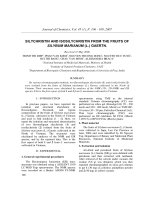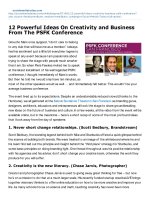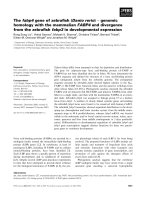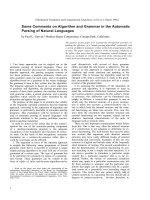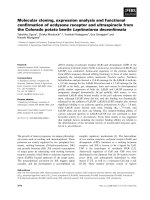12 Powerful Ideas On Creativity and Business From The PSFK Conference
Bạn đang xem bản rút gọn của tài liệu. Xem và tải ngay bản đầy đủ của tài liệu tại đây (103.48 KB, 5 trang )
socialmediatoday.com
/>utm_source=feedburner&utm_medium=email&utm_campaign=Social+Media+Today+(all+posts)
12 Powerful Ideas On Creativity and Business
From The PSFK Conference
Groucho Marx once quipped, “I don’t care to belong
to any club that will have me as a member.” I always
feel his sent iment just a little bit everytime I agree to
speak at any event because I am passionate about
trying to share the stage wit h people much smarter
than I am. So when Piers Fawkes invited me to speak
at the latest installment of his well regarded PSFK
conference, I thought immediately of Marx’s words.
But then he told me I would only have ten minut es, as
most of the other speakers would as well … and I immediately felt better. This wouldn’t be your
average business conference.
The event lived up to its expectations. Despite an understandably reduced crowd (thanks to the
Hurricane), we all gathered at the Kabuki Sundance Theater in San Francisco as branding gurus,
designers, architects, educators and ent repreneurs all took the stage to share groundbreaking
new ideas on the future of business and culture. In a few weeks, all the video from the event will be
available online, but in the meant ime – here’s a short recap of some of the most profound ideas
that I took away from t he day of speakers:
1. Never short change relationships. (Scott Bedbury, Brandstream)
Scott Bedbury, the branding legend behind both Nike and Starbucks offered a quick glimpse behind
the scenes at building both brands. We were treated to an image of the whiteboard where he and
his team first laid out the principle and insight behind the “t hird place” strategy for Starbucks, and
some basic principles on doing branding right . One thread throughout was his positive relationship
with his agencies and his advice: don’t short change your creative t eam, otherwise the work they
produce for you will suffer.
2. Creativity is the new literacy. (Chase Jarvis, Photographer)
Creator and photographer Chase Jarvis is used to giving away great t hinking for f ree – but now
he’s on a mission to do that at a much larger scale. His recently funded startup creativeLIVE brings
together visionary thinkers to offer online education on how to be more creat ive and improve your
life. As many schools focus on science and math, teaching creativity has never been more
important, and as Chase noted in his talk: “everyone deserves access to the top 1% of teachers in
the world.” I’m already thinking about how I can create my own course t o offer there.
3. Good game design is about changing behaviour. (Jason Oberfest,
Mango Health)
You may not realize this, but 4 out of 5 Americans take some combination of medication and
dietary supplements. And keeping all this straight is an impossible task. Jason Oberfest wants to
help, and his startup Mango Health has an app that reimagines how game design can help each of
us to become healthier by tracking our own habits and getting rewarded for it. As health costs
soar and awareness of healthy (and unhealthy) behaviour rises, tools like this have t he potent ial to
actually change behaviour for the positive – and that’s good news for all of us.
4. The story of the maker can reinvent retail. (Dana Cho & Beau
Trincia, IDEO)
Over time, each of us have become more disconnect ed from the products that we consume on a
daily basis. But social media is helping to close that gap, as new apps promise to take us behind
the scenes t o look at everything from overseas labor practices to carbon f ootprints. The
opportunity, as Dana Cho and Beau Trincia from IDEO shared in their presentat ion, is for brands to
embrace and proactively share their “story of the maker.” In a world where people long for that
human connection, taking them behind the scenes (as brands like Rawley Denim and Etsy are
doing) can create die-hard fans and inspire coveted brand loyalty … not to mention sell more stuff
at retail.
5. The future of marketing is about sharing value, not money. (David
Deal, iCrossing & Jermaine Dupri, Global14)
People connect with one another because of shared passion … and they click a button to
become “friends” for far more trivial reasons. In this interview st yle presentat ion, Jermaine Dupri
shared the motivat ion behind creating his own social network Global14 based on shared passions
for music, culture, life and women. The build in motivation for participat ion is because people love
to share their interests more than anything else.
6. Sitting on a couch next to one another is the ultimate
engagement. (Joe Gebbia, AirBNB)
The story of AirBNB is one of random unexpected connections, and everytime you see a founding
member talk about the site … t hey tell these stories. People unite through this deeply personal
moment of opening their homes to strangers, and an idea that any critic might have easily f ound
reasons not to do is slowly turning into a movement that is not only reshaping people’s lives …
but based on the kindness of strangers to open their homes to those stranded by the recent
hurricane, it is providing a much needed way to scale kindness in the face of natural disasters.
7. Ambiguity creates engagement. (Stephanie Horstmanshof and
Kristin Dean, Bing)
When Microsoft launched their ambitious new search engine, it has an interesting f eature that
distinguished it from nearly every other search engine in the market … the homepage feat ured a
single large image that rotated each day. On a rare appearance on stage, the curators of that
image Stephanie Horstmanshof and Kristin Dean offered a look at how they select new images
each day, and offered many tips for picking great imagery. Chief among t hem was to build in a
sense of ambiguity. People should see and image and want to know more – that is the ultimate
goal.
8. I can’t change your mind – only you can change your mind. (Eric
Corey Reed)
This relatively quick point was part of a fast and furious presentation on the benefits and folly of
green building as it stands today by Eric Corey Reed. The presentat ion introduced the idea of what
Eric called “Dodo Sapiens” – a funny way of describing the self destructive behaviour that only
humans seem able to produce. Bringing in new ideas like biomimicry and futuristic buildings inspired
by nature – his vision was f orward reaching and inspirational. Now the only challenge is to try and
inspire more people in the industry to change their staid thinking for new innovative approaches.
It’s an uphill battle.
9. Design can reinvent mass transit. (Michael McDaniel, Frog Design)
In what was easily one of my favourite presentat ions of the day, Michael McDaniel went through a
stunning case study of what it might be like if we could act ually reinvent the way that we do
modern mass transit. If you watch any one presentation from PSFK online when they come out,
this one should be it. The scope of the challenge he and his team at Austin based Frog Design
took one was vast … but the solution they offered, and the way they thought through every
aspect from the building to the marketing was, in a word, brilliant. Their idea could do more t han
reinvent mass transit, it might just change they way you approach describing and pitching your
own big ideas as well.
10. Inspiring students to be better writers changes everything.
(Gerald Richards, 826national.org)
One thing I have told my students for years is that there is no skill that they will use more every day
than writ ing. The problem is, most of the ways we use writing in schools suck the fun out of it. So
many students grow up hating to write, and never discover a love for it. 826national is devot ed to
changing this through their broad mission of changing how students learn. With real physical
locations in more than ten cities across the US, their mission is affecting kids across the United
States. Their venue in DC – The Museum of Unnatural History – was intriguing enough that I
already promised to volunteer there when I get home.
11. The bigger we get, the smaller we [need to] get. (Eric Ryan,
Method)
With their justified reputation as one of the quirkiest and most creative companies in the world,
Method has been reinventing the soap and detergent product categories for years now. But this
past year they were acquired and are in the process of merging with a European partner … all of
which creat es real challenges t o maintain that personality and what made them a great company
in the first place. In this short presentation, Eric Ryan shared some of the ways that the ethos of
the company has been t o stay small even in the face of growing products, people and profits. Only
companies that make this a cultural priority manage to stay great, and Method is clearly
determined to be among them.
12. Great spectacle can create preciousness in the physical world.
(James Tichenor, Rockwell Group)
A great choice for the final present ation of the day, James Tichenor shared several case studies
of projects that t he Rockwell group recently worked on to reinvent everything from a Vegas
Casino’s lobby to an out door space in Silicon Valley. The design philosophy of “choreographing
environments” was a perfect way of describing how the Rockwell Group creates precious
moments for any of us to experience. Life is not lived in a virtual bubble – and when you bring the
digital and the real together, you can create the most powerful spectacles that any of us are likely
to experience in our lives. And if you think about it, that is probably the coolest purpose for work
that any of us could have.
COMING SOON: Links for all t he videos will be coming soon, and I will update this post with them
as soon as all t he talks are available online.
Connect:
Aut hored by:
Rohit Bhargava
Rohit Bhargava is a marketing expert and leading voice on how to bring more
humanity back to business. He is the best selling author of two business books.
LIKEONOMICS , his second book, was released in May of 2012 and focuses on why likeability
is the real key to success and is a # 1 Global Marketing Best Seller. His award winning
personal blog Influential Marketing has been read by millions
See complete profile
Would you like to contribute to this site? Get started »

